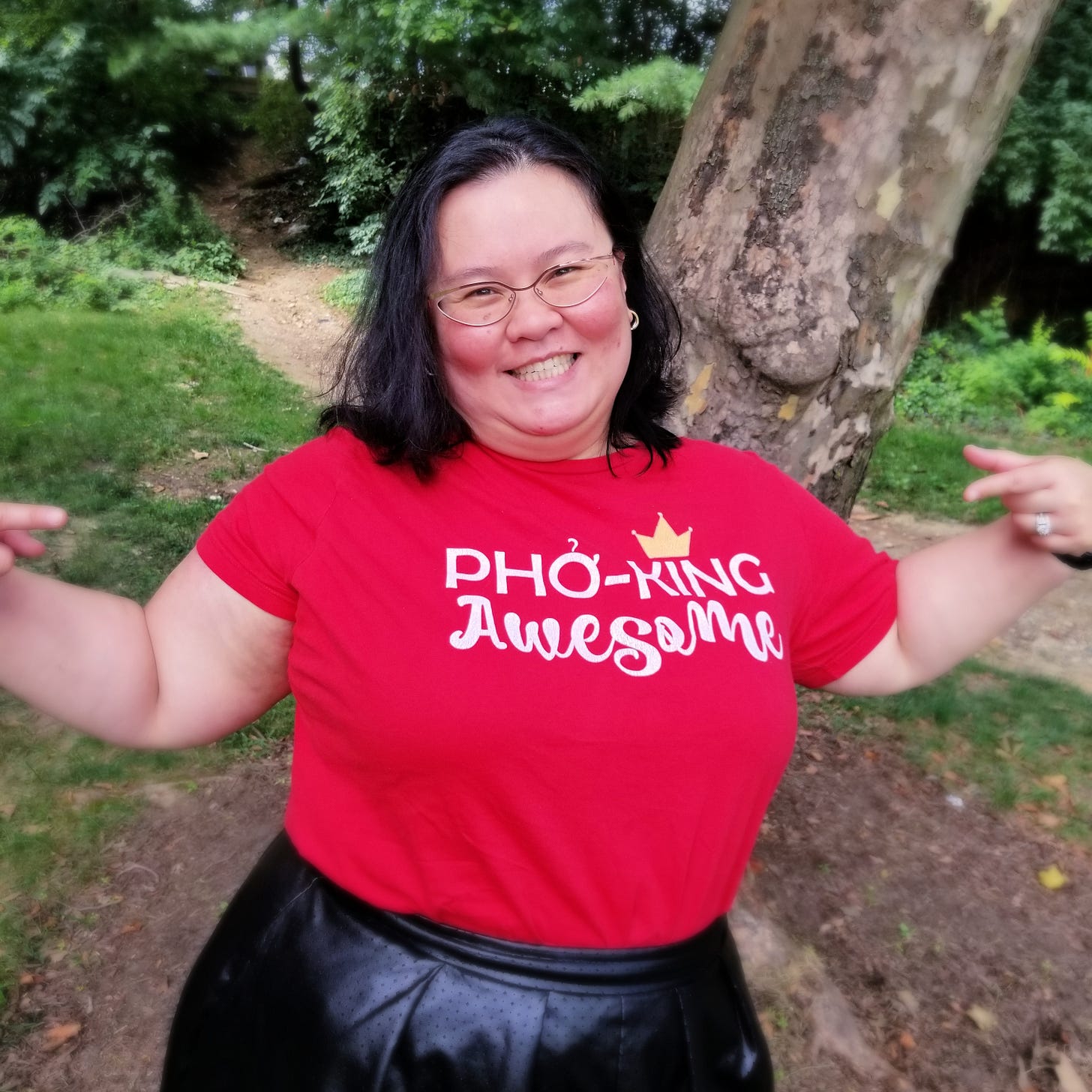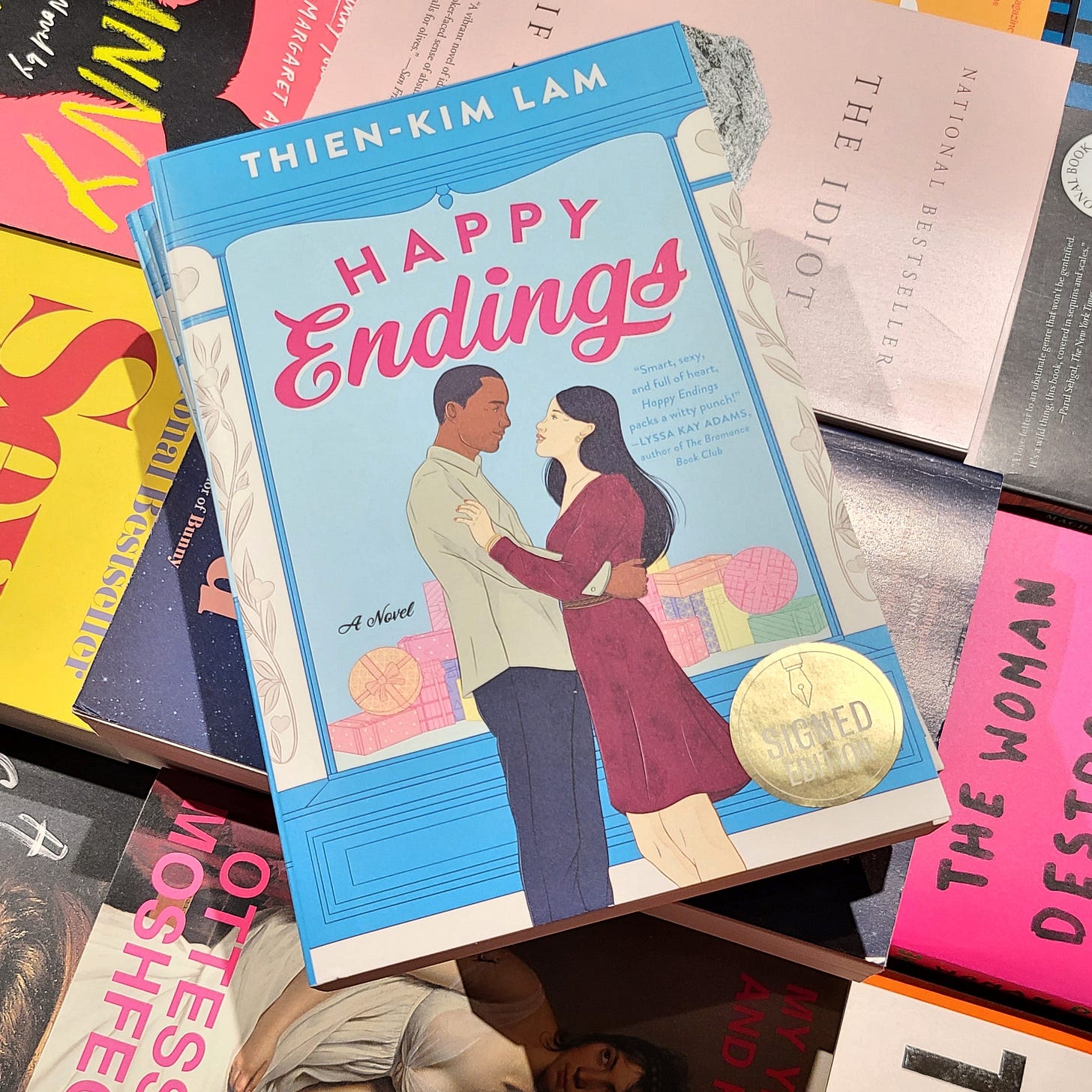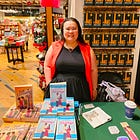Early in my career, I learned the hard way not to read or listen to reviews of my books.
I was so excited that an AAPI podcast discussed my debut Happy Endings so I plugged in my headphones and settled in for the ride.
Turns out they didn’t like my book.
It was too unbelievable for them. How could Vietnamese parents be ok with their daughter dating a Black man? Why weren’t Trixie’s parents more upset that she quit college? There were other criticisms but those were the ones that stood out.
As upset as I was, I couldn’t stop listening.
From that point on, I asked my agent and close friends to vet reviews for me. Yes, I know reviews aren’t for the author, but I hoped they’d find something that resonated with them. I’d worked so hard to share a part of my Vietnamese heritage and experience growing up in Louisiana because I hadn’t read any romances with those particular things.
Feeling Not Asian Enough
That wasn’t the only time were I felt I wasn’t Vietnamese enough or Asian enough. I let these feelings fester when I worked on Something Cheeky, my first novel with two Vietnamese main characters.
Not only were they Vietnamese American, but from two different parts of the United States with different upbringings. Derek grew up in a small central NY town as the only Asian American family there while Zoe grew up surrounded by a large Vietnamese community in Falls Church, Northern Virginia. Additionally, they both had careers than Asian parents stereotypically don’t want for their children.
I was stuck so many times. I’d fly through writing a few chapters and then second guess myself. Were the characters’ motivations good enough? Was the book too Asian for non-Asian readers or not enough for Asian readers?
I’d put too much pressure on myself to get this novel right that I’d frozen my creativity. I’d done the worse thing possible:
I’d taken the joy out of my writing process by worrying what others would think.
I couldn’t see this at the time when I was in the trenches of drafting Something Cheeky. Looking back I can see it clearly though I’m not sure what I’d tell my past self about.
As an Vietnamese American writer, I’d put pressure too much pressure on myself to represent Viet American characters in romance. One of the reasons I started writing was because I didn’t see myself in romances so I felt it was my responsibility to help others see themselves in my stories.
It’s not only internal pressure I face.
Writers of color are held to a higher standard
Authors of color are held at a higher standard by both their community and those outside of it. Traditional publishers prioritize stories of immigrant trauma and racial conflict. Those are the books that receive more marketing and publicity because it makes white readers feel good.
Look at this Viet character who’s overcome so much and found joy because they’re in the United States where you can achieve anything if you work hard enough. It feeds into the fantasy of the American Dream without accounting for systemic racism, misogyny, and classism.
Yes, it’s more important than ever that writers and history document the history of immigrants in the United States. But it can’t be the only stories we tell. Chimamanda Ngozi Adichie has a fantastic TED Talk about the danger of a single story.
I don’t necessarily write these types of trauma porn. Yes, cultural expectations play a part in my characters’ backgrounds, but it’s not the thinking keeping them from what they want. Things like gentrification and fatphobia also play a part. Like actual people, my characters are complicated.
Until we have more books published by BIPOC authors, we will continue to put pressure on these authors to represent everyone in their background. It’s too much to ask for one person. The more stories we have, the more readers can see how diverse our experiences are, even within a specific heritage or culture.
Yes, I’m Asian Enough

What helped me to finish writing Something Cheeky was blocking out those other voices as best as I could. I focused on my Zoe, Derek, and their friends. This novel has the most Asian characters I’ve ever written. Each one has their own history and their own dreams.
Once I made a conscious decision to make this novel Asian AF, I brought joy back into my writing process. Revisions are for the reader, but the first draft is for me.
Being Vietnamese American doesn’t mean one specific experience. We’ve grown up in small towns and big cities. Some of us grew up with the traditional expectations while others were raised with more freedom.
That’s what it means to be part of the Asian American diaspora. I want my novels to represent a variety of Vietnamese American experiences so hopefully readers can see themselves in my characters.
Yes, you’re Asian enough.
Hey, have you pre-ordered my Asian AF romance Something Cheeky? You can also pre-order signed copies from Loyalty Books.
Publisher’s Weekly loved it: “Lam moves the plot along at a rapid clip while balancing fun behind-the-scenes drama; sparky, sex-positive romance; and nuanced social commentary. This is a treat.”







I love this so much, friend––I have this feeling about my writing so frequently, but I had to let go of worrying whether I was meeting the expectations for everyone else when it comes to the Black/Asian/fat/queer/overall intersectional rep that I include in my stories. It's simply not possible to please or even attempt to represent everyone, so I focus on staying true to the experiences and characters I'm sharing. Having lived in New Orleans for a few years, which is such a rich cultural melting pot, your book felt very real to me. Keep on keepin' on, friend. Your stories are finding the right ones too. <3
I decided 2025 was going to be the year I serialized my AA memoir on Substack because I realized as you so astutely pointed out, "Traditional publishers prioritize stories of immigrant trauma and racial conflict." But mine is quirky, sometimes funny, modern, and doesn't subscribe to the stereotypes that the "community" sees us as.
As a result, I knew I had to be okay with crickets, with not a lot of appreciation, etc. I hope you keep doing what you're doing -- fighting the stereotypes, tropes, and ideas both within the AA community and without who believe that we have to be pigeonholed into some sort of depressing narrative. Stay strong, f*** the critics, don't be for everyone because a) it's not possible and b) that means you've done something very wrong. Hugs from Cambodia!